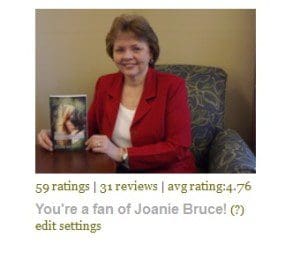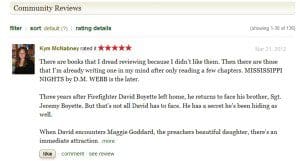Remember those 25 million readers using the social media platform Goodreads we talked about earlier? Now that you’ve joined the Goodreads Author program and have learned to get your books out there, it’s time to discuss interacting with those readers—just not all of them at once.
Update Your Profile
Think of your Goodreads profile as your introduction to your readers. You want to give them the basics—where you live, if you have pets, kids, etc.—but you also want to seem like a fun and interesting person. Avoid just giving a list of facts about yourself. Instead, present your bio in a unique way that tells the reader just as much about yourself as the facts you give.
Also, update your picture and give your personality a “face.” Try to use the same picture that you use on the back of your most recent book and other social media profiles. This cuts down on the confusion, especially if there is another writer out there with your name.
 Fans vs. Friends
Fans vs. Friends
A fan is a person who follows you and wants to receive updates, similar to “liking” a page on Facebook. A friend is a person that you have gotten to know personally, whether online or in “real life,” like Facebook friends. You want more fans than friends. Since you have a limited amount of time to invest, you can only keep up so many relationships. But a fan doesn’t ask you to feed her dog while she’s gone or to be her bridesmaid. They just like your books and want to know more about them and more about you.
Most authors provide a way just for fans to contact them, maybe a special email or mailing address. This way, you can interact with your fans, but don’t feel obligated to attend so many weddings.
 Don’t Comment on Reviews
Don’t Comment on Reviews
Yes, it may be a struggle. You worked on your book for so long and want to thank that reader for their kind words, but resist the temptation. An author needs to keep a low-key presence on review boards, which includes bad reviews too. Every book gets some bad reviews, but don’t retaliate. Instead, respond with silent grace. These reviews, and your reactions, are public for anyone and everyone to see. One bad reaction from an author can cause a reader (or readers) to hate that author’s work for a lifetime.
By keeping your presence off review boards, you give readers the opportunity to review without fear of author reaction. These reviews are more honest and usually encourage readers to review your book even more.
On rare occasions, if a particular positive review knocks you off your feet, and you are in awe, filled with thankfulness, I would suggest sending that reader a one-on-one message. It’s private, so you stay out of the public eye, but you can also show appreciation for that excellent review.
Don’t Join Groups Just to Promote Your Book
Think of it like going to a book club meeting, and Jane Smith comes up and says, “Hi! I’m Jane. Here’s my new book!” Every time you try to suggest that she actually talk about that month’s book, she just keeps chattering away about her own work. Narcissistic, right?
So as an author, when you join a group, follow the rules and discuss with them. Eventually, you may have a chance to talk about what you are working on, but be delicate. You don’t want to be just another Jane Smith.
Well, there you have it. The basics of author and reader interactions. If you have any additional questions not answered here, please comment below or contact us on Twitter @AmbassadorIntl. And don’t forget to check out the giveaway Ambassador is currently running on Goodreads. Enter to win one of five copies of Willing to Die by John Muntean:
Goodreads Book Giveaway
Next week, we’ll give you some tips and tricks for using Goodreads with your Facebook and Twitter accounts. Until then, enjoy your new knowledge of Goodreads!






